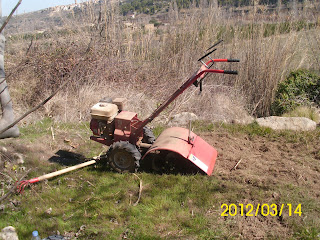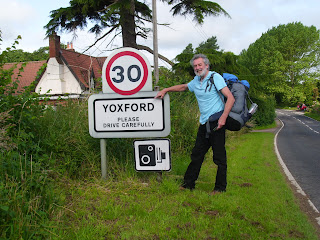I went to this wonderful wedding in Galicia in May and wrote a blog about it (see below). I sent my account to Jacobo, the groom, and he decided to translate it into Galician. And I thought, well why not put the Galician version up here as well. Makes my blog seem so much more...international! (See the photos in the original English version.)
Traducción do orixinal en inglés.
Viaxamos
dende a nosa casa en Aragón para regresar a Inglaterra, facendo unha ruta máis
longa para cruzar a raia con Portugal e ir logo cara o norte, a Galicia. A voda
celebrábase na vila de Ordes, cerca de Santiago de Compostela, logo iríamos
cara Santander a coller o ferry. Choveu.
No
día da voda a irmá máis vella da noiva colleunos ao mediodía, como prometera,
para logo coller outra invitada, Isabel, nun hotel da vila. Ambas mulleres
falaban inglés, moito mellor que o noso español. Conducimos cara un lugar preto
de Ordes e a irmá mostrounos o camiño ao garaxe. Esta era a casa da nai e o pai
da noiva, e estabamos alí para os aperitivos: o momento de comezar a beber
chegara. Unha mesa grande, chea de pinchos
e todo tipo de bebidas estaba rodeada por xente diversa vestida de punta en
branco. A máis impresionante era a irmá máis nova da noiva, cun espectacular
vestido verde e a súa prima, incluso máis espectacular cun vestido cor cereixa;
ámbolos dous longos e cinxidos. A nai da noiva vestía de malva e era afable, pero
seu pai era un chisco reservado –
probablemente non tiña nin idea que dicirlle “aos ingleses”. Nembargantes, rapidamente
fixémonos amigos de Isabel, a que coñeceramos no coche, e Sindo, un home alegre
que pasou case vinte anos vivindo cerca de Londres traballando de albanel.
Tomei unha cervexa con el e pareceume moi divertido. Contoume que a súa muller
non lle gustaba Inglaterra. Non falaba ben inglés e dáballe medo coller o
teléfono. Agora regresara á súa Galicia natal e contoume que as vodas inglesas
eran aburridas, ao contrario que as galegas, que eran moito máis divertidas.
Sorrín e decidín agardar e comprobalo. Patricia, a noiva, apareceu: estaba
pálida pero preciosa nun vestido de noiva
branco e axustado.
O
irmán de Patricia levounos de volta a Ordes. A igrexa estaba á volta da esquina
dende o piso dos noivos: a noite pasada prestarámoslle atención, no medio da
choiva, á lámpada acesa, moderna e con vidreiras.
Vimos
a chegada de Patricia no coche que a trouxo ata a igrexa. Jacobo, o noivo,
estaba xa xunto ao altar vestido nun elegante traxe de chaqueta longa.
Afeitárase a barba corta que tiña do día
anterior e tiña aspecto garboso. É un
home alto cunha boa mata de pelo revolto. Saudámolo e vímolo razoablemente
tranquilo. Houbo algo de atraso antes de que entrase Patricia do brazo do seu
pai. Conmovedora música de violín acompañaba o seu paso: música que me
encantaba e coñecía ben pero non podía realmente identificar. Ese paseo debe
ser longo para calquera noiva.
O
crego era un señor maior con voz
agradable. Vestido en branco e ouro, sentou á parella de noivos nun banco
mirando cara o altar cun padriño a carón de cada un. A misa foi longa e opaca.
Foi compasivamente interrompida por máis agradable música tocada por dous
músicos que estaban fóra da miña vista durante a cerimonia (ao principio pensei
que era una gravación de moi boa calidade) e polas lecturas feitas con
seguridade polas mozas dos impresionantes vestidos. A maioría das palabras do
crego eran en galego, coido. A miña mente íase ás veces porque non entendía, pero
ollaba a costume do crego de erguer as mans ben altas e mirar cara o ceo como
contándolle a Deus o gran peixe que collera.
Analicei
a igrexa. Era románica, bastante sinxela, e supuxen que bastante moderna. Suficientemente
bonita e resaltada por un soberbio retablo dourado cunha porta dourada colocada
nun piar. Este era o lugar onde o crego gardaba o viño. Recolleuno de forma
cerimoniosa ao terminar o ritual. Nun momento dado houbo un complexo
intercambio de aneis que non puidemos ver. Nembargantes, todo foi gravado; as
dúas fotógrafas parecían poñer os obxectivos das súas cámaras directamente nas
mans dos prometidos. Despois todos estabamos dándonos as mans como se fai nas
misas católicas por algún motivo - un
bonito xesto – e logo para fora a tirar o arroz, o cal parecía bastante
doloroso para os que o recibían e divertido para os cativos. Comezou a chover, pero
os galegos non se inmutan por un pouco de chuvia, incluso nun día de voda.
O
banquete tivo lugar nun marabilloso lugar no campo. Un emprendedor erixiu unha
enorme carpa no xardín dun magnífico pazo. O teito da construcción era de lona
pero as paredes eran maiormente de vidro, (excepto os baños, por suposto). Un enorme
tubo transcorría ao longo da “carpa” e era, imaxinei, para o reparto de aire
quente nos días de frío. Non necesitabamos aire quente, a temperatura era agradable
dentro. No xardín había un auténtico emblema de Galicia: un “hórreo” enorme.
Estas cousas son realmente pallotes para almacenar gran, etc. e calquera
minifundio que se prece ten un. Son estreitos e altos e poden ser bastante
vistosos con alomenos unha cara con
doelas para permitir a entrada do aire. Pero a parte máis salientable destas
estructuras é a base. As construccións varían, pero a maioría consisten en algo
parecido a unha copa de viño invertida sen o cáliz e feitos de pedra ou
cemento. Os ratos ódiano porque son infranqueables e os fungos (NdT: Dry Rot - Serpula lacrymans)
perden a esperanza de enviar as súas destructivas rizomas abaixo ao húmido chan.
Ao
carón do hórreo (o máis grande que vira) había un alpendre que albergaba o zona
de fumadores. Na mesa había puros, cigarros e mistos de balde. Este luxo
podería ter acabado cos meus vinte anos de abstención, pero aguantei.
Fomos
agasallados con máis saborosos petiscos e con un sen fin de vasos de viño doce
e rapidamente perdín o apetito e xa estaba un pouco bébedo. Estaba listo para
bailar. Pero aínda había máis cousas por comer. Os máis ou menos cento
cincuenta invitados fomos conducidos a
mesas redondas onde todos atopamos unha minuta cos diferentes pratos e unha
lista de viños. Estabamos orgullosos de que nos sentaran na mesa dúas, a carón da mesa principal; eu
estaba sentado ao lado do irmán pequeno do noivo, nunha mesa chea de xente que
falaba inglés. Elegantemente disposto, había un boliño de pan pegado a cada
prato tan grande que podía ser facilmente confundido por unha loaf (NdT: peza de pan grande e alongada
xenuinamente inglesa).
Medio
lumbrigante e unha das súas pinzas formaban o primeiro prato e namentres me
enfrontaba ao delicado problema de extraela carne disto, os camareiros
continuaban vindo con máis, e máis, ignorando as miñas súplicas de “suficiente”
(NdT: No orixinal). Bañado cun viño
branco máis amargo, este festín foi rapidamente substituído por ameixas que
pregaban ser comidas e ser regadas por máis viño branco e logo substituídas por
un prato como é debido de delicioso linguado – e máis viño branco. Sobrevivín
ao prato de peixe e coidaba que isto era todo. O meu estómago estaba de acordo,
pero mirei o sorbete de mango con sospeita – xustamente. Isto era o anticipo do
prato de carne! Estaba completamente cheo, pero a carne era tan sabedora que a
comín xunto coas verduras e probei o equilibrado viño tinto. Afortunadamente a
sobremesa era lixeira e iso (signo de alivio) foi todo. Un banquete realmente
suntuoso e memorable para cento cincuenta persoas.
Non
houbo discursos, o cal estivo ben porque non os teríamos entendido, pero a cada
pouco xurdía un berro, normalmente comezado por unha animada mesa de rapaces “fedellos” que estaban ao fondo
(amigos do instituto de Jacobo, coido) e logo continuado por moita máis xente.
Non entendía as palabras, pero o significado era claro: era unha petición para os
noivos para bicarse. Pretendían resistirse, pero sucumbían con grandes
aplausos. Logo houbo peticións para que se bicaran os padriños. Despois houbo un brinde xeral
polas avoas, ao que todo o mundo bebeu. Posteriormente en tódalas mesas, a
xente ergueuse para xuntar as copas e brindar por calquera cousa que lle viñese
á cabeza.
Cunha
sinal acordada de antemán a noiva e o noivo desapareceron e a música comezou - unha peza de baile de salón dalgún tipo, a
través das portas que levaban aos baños, os noivos apareceron repentinamente,
bailando marabillosamente coa súa vestimenta perfecta. E, para o meu asombro,
Jacobo de repente colleu en alto á súa nova esposa e arremuiñouna. Pensei que
era un movemento perigoso despois de toda a comida e bebida, pero todo foi ben
e a música foi inundada por aplausos e ovacións. Á parella uníronselle os
padriños e a seguinte fase da festa comezara: beber e bailar.
Intenteino
pero teño que admitir que non fun capaz. Pesado como estaba por tanta comida e
viño, o meu corpo delgado só aguantou dúas pezas (frouxo) sen embargo pensei
que Margaret tiña ganas de máis. Camiñamos
polos xardíns e observamos o cada vez máis frenético baile, maiormente
estaba esparexido en grupos e a maioría centrados nos rapaces fedellos. O cénit
desa parte da noite alcanzouse cando o DJ tocou unha popular canción
nacionalista galega (NdT: Miudiño),
algo equivalente a Rule Britannia penso. Transformou os bailaríns en cantantes.
Retirámonos
da pista de baile pasando algún tempo
falando con amigos dos noivos que
tamén viñeran dende Oxford. Despois diso facilmente poderíamos ter ido a gozar
dun sono profundo, pero tiven unha idea. Tras dous rons con Coca-cola estabamos na pista de baile xunto aos
mellores, dous máis e tiven que pedir unha Coca-cola sen o ron para Margaret – estábase
convertendo nunha compañeira de baile pouco fiable e necesitaba moito apoio
físico. Mentres tanto os rapaces fedellos estaban sendo máis fedellos, estaban
lanzando ao aire aos noivos. O máis dinámico, Pablo, quen traballaba en Italia,
tíñase quitado a chaqueta, a gravata e maila camisa e parecía un loitador máis
ca un bailarín. Nun momento dado bailei con Sindo; homes maiores imitando aos
rapaces fedellos.
Durante
a noite démonos conta de que tiñamos unha relación con algunha xente da voda:
xente que pensabamos que eran completos descoñecidos. Catro anos atrás
prestarámoslle a nosa casa en Oxford a Jacobo e Patricia mentres nós estabamos
en Asia. Cada certo tempo alguén se acercaría a nós (incluído Pablo, o
loitador), a preguntar se eramos Rob e Margaret para logo contarnos que tiñan
estado na nosa casa uns días. A moitos deles encantáralles o baño da planta
baixa onde instalara unha bomba manual de cervexa dos pubs como cisterna. Todos
eles mostráronse un pouco tristes coa venda da casa.
Jacobo
e Patricia eran perfectos anfitrións, ás veces bailando de forma enérxica cos
mellores, ás veces na cadea de bailaríns bailando a conga, ás veces
preguntándonos a nós ou a outros invitados se estabamos ben – estivémolo en
cada momento. Gozamos tremendamente do día enteiro pero aledámonos cando Jacobo
atopou unha parella que marchaba cedo (a iso das 3 a.m.) para levarnos de
regreso á nosa caravana. Díxenlle adeus a Sindo e admitín que as vodas galegas
eran realmente mellores que as inglesas.










